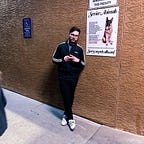Thoughts on Blue Bayou
For as long as I can remember I always thought motorcycles were really cool. I can’t even ride a bike so the idea of me getting on one is ludicrous and hilarious.
My failures are beside the point.
There’s just something so American about riding your iron horse through the dusty southwest. Stopping at a tavern somewhere getting a drink and hitting the road before anyone learns your name. Even in films, they stand as a testament to a certain freedom. Freedom to a system that holds you down in Easy Rider, or even freedom to the laws around you shown by the Hells Angels in various forms. But, specifically, think of the depiction in Gimme Shelter.
When you’re a teen there’s nothing cooler than the idea of physical and ideological freedom. I promise I’m getting to a point here just stick with me.
Now, I’m older and this feeling of freedom has become less “I wish my parents would let me play Halo 3 longer” and instead it’s “I hope I can keep my morals and ideologies pure in a world that sometimes it feels like is out to destroy me.”
I have never seen a movie tackle these very specific and personal feelings until I saw Blue Bayou.
Justin Chon has been on my radar for a couple of years now. I was lucky enough to see his film Ms. Purple at Sundance where it showed and I was supremely impressed by the work. His visual styling is an ode to old masters with a very personal stamp. What I didn’t know was that his acting rivaled his directing skills.
He lets us sit in these beautiful moments in Blue Bayou. A man with his daughter showing her the things that make him happy. A motorcycle ride and a moment in a willowy swamp. It makes the melodramatic turns that happen later in the film have that much more of a punch. Most of all it just makes me happy to see such a talented voice still interested in the genre of melodrama.
Most of the film is expressly about Justin Chon’s character Antonio trying to be a good father and husband while also facing the threat of deportation, or as I like to put it: how can I still be a person while the world is outright trying to kill me.
My favorite moments of the film are when we the viewers are just watching Antonio drive his motorcycle. Sometimes, we see his eyes through the visor of his personalized helmet, and other times we look at just his back or shoulder. These moments of him racing through streets that he’s maybe lived on are his true moments of peace.
Antonio is living the motorcycle outlaw dream. He has his own little piece of heaven with his house and family, and in conjunction with all of those outlaws in the past the state just cannot have that.
You know the ending of the movie as soon as you get in. It’s not the important part. What is important are the moments we have in spite of it all.
That sort of moral and ideological freedom that we all crave.
I’m sorry if this is all over the place, but if you leave with anything from here leave with this. Go see Blue Bayou and support a truly singular artist in Justin Chon.
Thanks for reading.
